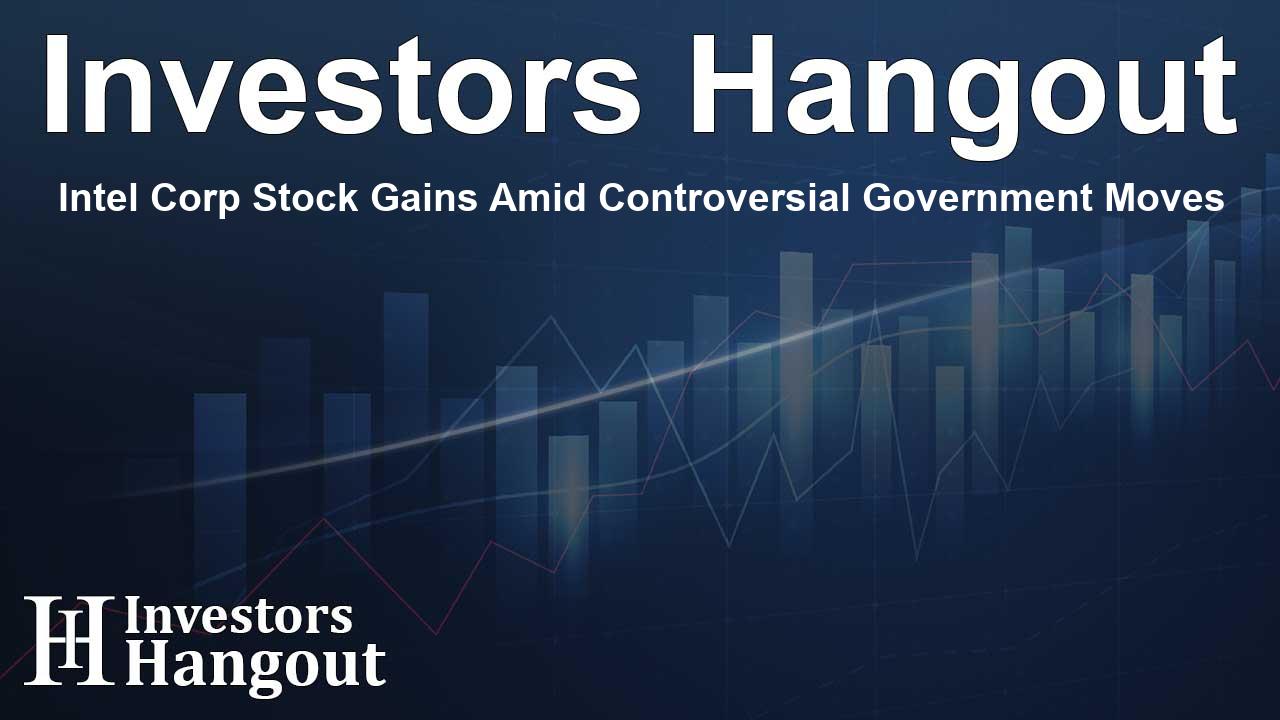Intel Corp Stock Gains Amid Controversial Government Moves

Intel Corp's Recent Stock Performance
Intel Corp.'s INTC stock has seen a considerable gain, increasing by more than 20% year-to-date. However, recent developments involving government stakes in the company have raised eyebrows among financial experts, leading to extensive discussions about the potential consequences for the stock's future.
Implications of Government Stake
Concerns Over Growth Stagnation
Experts suggest that the government's increased involvement might lead to stagnation akin to past economic downturns. Drawing parallels with the aftermath of the 2008 financial crisis, analysts warn that this could mark the beginning of a prolonged period of sluggish growth for Intel's shares.
Advice from Financial Analysts
Jamie Cox, Managing Partner at Harris Financial Group, articulates this concern clearly. He points out that when the government acquired stakes in major banks during the global crisis, those stocks remained stagnant for almost a decade. Cox advices that all companies facing similar interventions should proceed with caution.
Political Dynamics Surrounding Intel
Trump Administration's Investment
In a bold move, the Trump administration secured a significant 10% stake in Intel Corp. for a whopping $8.9 billion, financed through the CHIPS and Science Act funds. This controversial acquisition has sparked diverse opinions regarding its legitimacy and potential repercussions.
Defending the Investment
Kevin Hassett, a prominent economic adviser, has publicly defended this investment, framing it as a strategic move towards establishing a sovereign wealth fund. Meanwhile, President Trump has also expressed optimism about this venture, suggesting it could be a beacon of future opportunities.
Criticism from Free-Market Advocates
Reactions from Economists
Critics are not holding back. Economist Peter Schiff characterizes the investment as a “terrible precedent.” He argues that such actions push the country away from its foundational free-market principles. Schiff emphasizes that government involvement in the private sector undermines the essence of capitalism.
Support from Political Figures
Former Vice President Mike Pence has also weighed in, echoing concerns about deviating from the GOP's free-market ethos. He highlights the potential dangers of mimicking governmental strategies seen in nations such as Iran and China. Pence's statements resonate with many who oppose blending government and market dynamics.
Current Market Trends and Intel's Performance
Looking at recent trading sessions, Intel's stock closed slightly lower at 0.81% but showed signs of resilience with a marginal rise in after-hours trading. Year-to-date, the stock has surged impressively by 20.43%. Despite the volatility, analysts note a stronger price trend for INTC, although its growth rankings remain less favorable.
Market Movement of Related ETFs
In a broader view, today’s trading also saw upward movements in related ETFs. The SPDR S&P 500 ETF Trust (SPY) rose by 0.42%, and the Invesco QQQ Trust (QQQ) advanced by 0.40%. This indicates a favorable climate for technology sectors despite uncertainties surrounding significant investments.
Final Thoughts on Investment Strategies
The unfolding dynamics at Intel Corp. emphasize the intricate balance between government intervention and free market principles. Moving forward, it remains crucial for investors to monitor these developments closely, as they could have far-reaching impacts on the tech industry and broader markets.
Frequently Asked Questions
1. What significant changes have occurred with Intel's stock lately?
Intel's stock has surged more than 20% year-to-date, but government involvement is raising concerns about future growth.
2. How are financial experts reacting to the government stake in Intel?
Many experts express caution, citing potential stagnation similar to the post-2008 financial crisis.
3. What is the Trump administration's role in Intel's recent developments?
The Trump administration acquired a 10% stake in Intel for $8.9 billion, utilizing resources from the CHIPS and Science Act.
4. Are free-market advocates supportive of government investment in companies?
No, many free-market advocates criticize this move, believing it undermines capitalist principles.
5. How is Intel's stock expected to perform in the future?
While there are positive trends, the uncertainty from government intervention suggests investors should be cautious with their strategies.
About The Author
Contact Thomas Cooper privately here. Or send an email with ATTN: Thomas Cooper as the subject to contact@investorshangout.com.
About Investors Hangout
Investors Hangout is a leading online stock forum for financial discussion and learning, offering a wide range of free tools and resources. It draws in traders of all levels, who exchange market knowledge, investigate trading tactics, and keep an eye on industry developments in real time. Featuring financial articles, stock message boards, quotes, charts, company profiles, and live news updates. Through cooperative learning and a wealth of informational resources, it helps users from novices creating their first portfolios to experts honing their techniques. Join Investors Hangout today: https://investorshangout.com/
The content of this article is based on factual, publicly available information and does not represent legal, financial, or investment advice. Investors Hangout does not offer financial advice, and the author is not a licensed financial advisor. Consult a qualified advisor before making any financial or investment decisions based on this article. This article should not be considered advice to purchase, sell, or hold any securities or other investments. If any of the material provided here is inaccurate, please contact us for corrections.
